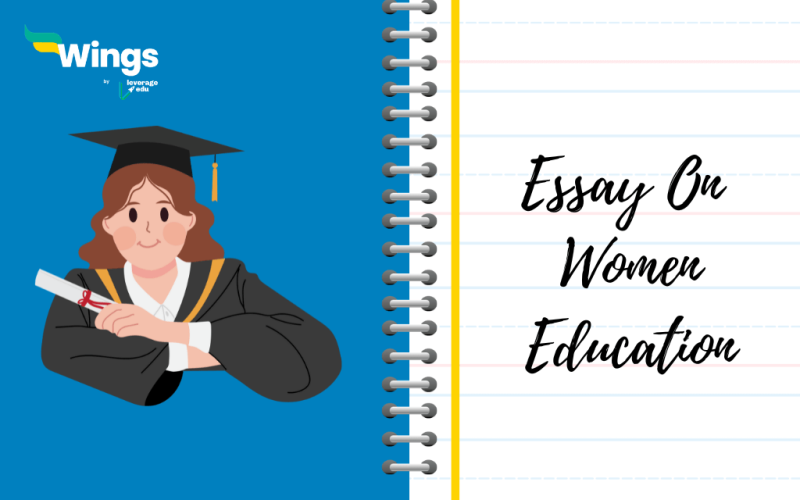Essay on Women’s Education: As per the Right to Education Act of 2009, every Indian girl has a basic right to education. With roughly 48.5 percent of its population being female, India is the second most populous nation in the world. India is one of the nations with the fastest economic growth, yet our women’s literacy percentage is much lower than the average worldwide. In this blog, we will talk about the importance of education for women and why they should pursue it.
Table of Contents
Learn about the importance of education in our society
Why is Education for Women Important?
According to UNICEF, it is said that by educating a girl will prevent them from marrying at a very early age and at the same time will help them to lead productive lives. Speaking of the advantages of educating a woman, it has many benefits.
Here are some of the benefits that every girl receives after studying:
- Education for girls helps to lessen inequality in society.
- Child mortality decreases when more women are literate.
- The education of women has a good effect on social, economic, and health standards.
- Women who succeed in higher education and develop their talents earn significantly more during their lifetimes.
- Children with educated mothers are less likely to suffer from stunting or malnutrition.
Also Read: Importance of Women’s Education
Essay on Women’s Education in (100 Words)
| Women’s education is crucial for societal progress. It empowers women, enhances their economic opportunities, and promotes gender equality. Educated women contribute to the workforce, drive innovation, and make informed decisions about their lives, health, and families. Education equips them with skills to break free from traditional constraints and participate actively in society. Moreover, it reduces maternal mortality rates and promotes healthier families. Governments and societies must prioritize and invest in it to unlock its myriad benefits and create a brighter future for all. |
Also Read: Essay on Knowledge Is Power
Essay on Women’s Education in (150 Words)
| Women’s education is of paramount importance in building a just and equitable society. Educating women not only empowers them but also contributes significantly to societal progress. Education equips women with knowledge and skills, enabling them to pursue meaningful careers and achieve financial independence. Moreover, educated women are better informed about their rights, leading to participation decision-making processes, both at home and in society. This, in turn, fosters gender equality and social harmony. Furthermore, women’s education has far-reaching implications for healthcare and family well-being. Educated women tend to have smaller families, as they are more aware of family planning methods and maternal health. This positively impacts population control and reduces the burden on resources. In conclusion, women’s education is an initiative for positive change, promoting gender equality, economic development, and improved living standards. To create a brighter future, societies worldwide must prioritize and invest in women’s education. |
Also Read: Essay on Generation Gap
Essay on Women’s Education (200 Words)
| Women’s education is a pillar of societal progress and gender equality. Empowering women through education has far-reaching benefits for individuals and society as a whole. Firstly, women’s education enhances the economy. When women have access to quality education, they can pursue careers, earn their livelihood, and contribute to their family’s financial well-being. This not only reduces gender disparities in income but also strengthens the overall economy. Furthermore, education equips women with the knowledge and skills to make informed decisions about their health, family planning, and overall well-being. Educated women tend to have smaller and healthier families, reducing the burden on healthcare systems and promoting a healthier society. Education also fosters women’s participation in social and political spheres. Educated women are more likely to engage in civic activities, advocate for their rights, and participate in leadership roles. This, in turn, leads to more inclusive and equitable governance. Moreover, women’s education breaks down stereotypes and challenges traditional gender roles, fostering a more egalitarian society. It inspires younger generations of girls to aspire to higher education and careers, creating a positive cycle of progress. In conclusion, women’s education is not just a matter of gender equality but a catalyst for social and economic development. By investing in women’s education, societies can unlock their full potential and pave the way for a brighter future. |
Also Read: How to Prepare for UPSC in 6 Months?
FAQs
Ans: Education for women is essential to the overall growth of the nation. A lady with a good education can manage both her personal and professional lives.
Ans: The “Sarva Shiksha Abhiyan” (SSA) has focused on initiatives for females, including the opening of schools in the area to make access easier for girls and to guarantee more involvement of girls in primary education.
Ans: Savitribai Phule was also the first female teacher in Indian history.
Related Articles:
| Essay on Save Environment | Essay on Unity in Diversity |
| Essay on Yoga | Essay on Water Pollution |
| Essay on Junk Food | Essay on Information Technology |
We hope this blog provides you with all the information about the importance of education for women.
To discover more essay-writing articles, then keep reading at Leverage Edu!
 One app for all your study abroad needs
One app for all your study abroad needs













